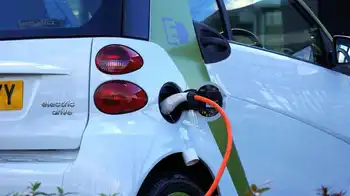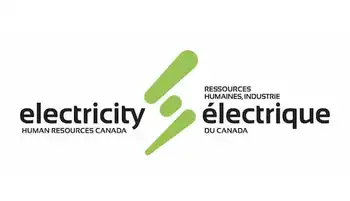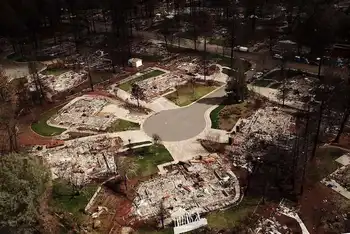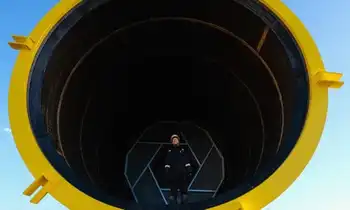Alaska energy center director lives off the grid
By Fairbanks Daily News-Miner
High Voltage Maintenance Training Online
Our customized live online or in‑person group training can be delivered to your staff at your location.

- Live Online
- 12 hours Instructor-led
- Group Training Available
She called home a small cabin in the woods, but really, she said, it was an abandoned place off the utility grid.
She's come a long way, helping Bernie Karl build his Chena Hot Springs Resort into an international prototype of renewable energy in action, and she recently was named director of the Alaska Center for Energy and Power at University of Alaska. Holdmann is a hot commodity in state legislative circles, with Senate and House energy committees repeatedly requesting her testimony on a variety of energy issues.
But she and her family, including twin babies, still live off the grid, now by choice.
The lifestyle has brought home to the engineer how crucial affordable energy is to the way we live.
"I've never lived on the grid," Holdmann said. "I've never had electricity since I moved to Alaska, never had running water. I got really interested in energy because I didn't have any.
"We really need energy; it's just this tool we use in our lives for all the beneficial types of things that we have and that we can't take for granted. It's a really interesting thing for me."
Growing up in Wisconsin, Holdmann entertained dreams of Alaska living from an early age. The majestic beauty and wide-open spaces captivated her, a pull that grew stronger as she got involved with sled dogs at a Minnesota kennel.
She majored in engineering and physics at Bradley University in Illinois on a full tennis scholarship — a sport the University of Alaska doesn't offer, or else she'd have moved north earlier.
The day she graduated from college, she packed her rig and headed to the Alaska Highway, destination Fairbanks, with dreams of running the Yukon Quest.
"I didn't know anyone and I didn't have a job per se, but I did have sled dogs," she said. "I wanted to be a musher."
In Fairbanks, Holdmann studied at UAF's Geophysical Institute for several years before taking leave to run the Quest in 1998.
The school was focused on research, but not on the real-world, applied research Holdmann was passionate about. She'd grown a bit disillusioned.
Holdmann returned to applied work as a design engineer for renewable energy systems at ABS Alaskan.
"It was more real, more tied to real life and the problems people deal with every day," she said.
She launched her own business, Your Own Power Company, and eventually left ABS to join Karl at the hot springs 60 miles east of Fairbanks, where she stayed more than four years.
"It was just a super-awesome opportunity to take this resort that was really inefficient and had a lot of issues in terms of energy costs, and try to turn everything around and make it as close to 100 percent renewable energy as we can," she said.
The two enjoyed a synergistic partnership, but Holdmann wanted to bring energy solutions to a broader audience. She transferred to the university's Alaska Center for Energy and Power, serving as acting director until earning the official title in July.
It's a challenge she relishes as she seeks not only to bolster renewable portfolios, but to make traditional energy production more efficient.
"There's a place for renewables and renewables are really important, but we need to be prudent about all types of resources we have in Alaska," she said. "Those resources belong to all of us, current and future Alaskans. We have so many opportunities here; it's just an amazing state."
Energy consumes much of Holdmann's time, and she loves it.
She's concluded that there is no single energy solution for Alaska, where needs are as diverse as resources. She's interested in how to drive state investment in projects that most directly benefit the state, and is hopeful for a state energy policy to set that direction.
"That's the kind of thing I think about in the middle of the night," Holdmann said. "What can we really do to think about energy and distribution in Alaska that's totally outside the box? What can we do here that could be really extraordinary and really set us on the path to being an international leader, not just in the use of our resources, but also in energy policy?"
Dogs remain a mainstay of Holdmann's world, although she hasn't been on a sled since her twins were born in August 2008.
Her husband, Ken Anderson, a noted musher who finished the 2008 Iditarod second to Lance Mackey, mushes full-time. That allows Holdmann to at least run dogs vicariously.
"He basically runs dogs, and I engineer solutions to energy," Holdmann said, a wide smile breaking. "I always feel like I'm the luckiest person on the planet, because I get to do all the things I love to do."
They lived in a 14-by-16 cabin for years, until recently building a 24-by-28 place on their own.
"It's still pretty small by most standards, but for us, it seems like a mansion," she smiled.
Their log home is powered with solar panels, batteries and a diesel generator, and they're hoping to invest soon in a wind turbine to supplement the renewable portfolio.
"We're just really conscious of how we use our energy and how much it costs," Holdmann said. "It just made me really aware of what the different options are and made me start to think more about energy on a society basis."
They run several vehicles on waste vegetable oil, although Holdmann, a busy mother of twins, said she occasionally fills the tank with regular diesel.
"I have to admit that I cheat sometimes," she laughed. "You can't do everything."











